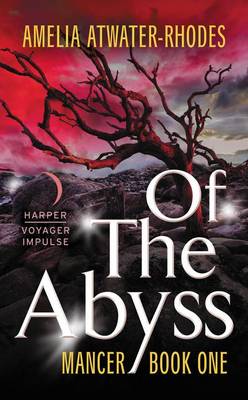Reviewed by Quirky Cat on
Warnings first: It’s worth noting that Of the Abyss is much more intense than Atwater-Rhodes’ previous works. Along with some animal violence and death (usually in the context of hunting) there are a slew of magic users that require blood and/or pain to cast their magic. This comes up frequently, so keep that in mind.
Of the Abyss was a fascinating read on many levels. The world is intriguing, with different forms of divinity creating their own types of magic (all complementary to what they are, of course). There’s the human world, Kavat. This is obviously where the humans and the mancers live. Then each type of god appears to have their own realm – or at least the Numini and Abyssi do. We didn’t see much of the Numini’s world this time around, but we got an in-depth view of the Abyss. Much like Dante’s inferno there are layers and circles (called courts) leading deeper and deeper in the Abyss. It’s worth noting that the Abyss is undoubtedly an allegory for hell; the details of the world make that pretty apparent. The creatures gain magic through blood, pain, and flesh.
The political system was also interesting – although we’re evidently supposed to come to the conclusion that it is flawed and corrupt. No mancers are tolerated in the city, and any caught will be put to death. There are literally no exceptions to the rule. Not even for the healers or other benign forms of magic. Our first interaction with a mancer is from Hansa’s perspective, which shows all mancers in a bad light. That assumption is quickly flipped onto its head with the introduction of Xaz, a Numenmancer. Her magic appears to be less violent – though admittedly we don’t see her doing anything altruistic with it either.
Most of the characters in the novel are fighting their own demons, along with the ones that are clearly using them as chess pieces. Their struggles defined them as human in a way that nothing else could have. I found myself wanting to see Hansa and Umber succeed more than I had previously. Though conversely I felt that Cadmia’s change was a bit abrupt (perhaps she is under another influence yet shown?), bouncing from one extreme to the other. I found myself rooting for Xaz too – though I don’t know what I actually wanted to have happen in her case. I suppose I wanted some sort of acknowledgement for her situation?
On the whole I have to say I’m really thrilled with the improvement I’ve seen in the author’s writing style and world building. I can’t wait for the second book - which, fortunately for me, is already out.
For more reviews, check out Quirky Cat's Fat Stacks
Reading updates
- Started reading
- 17 August, 2017: Finished reading
- 17 August, 2017: Reviewed
